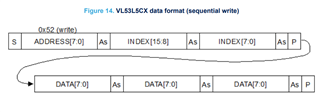Hello,
I am developing a driver for the vl53l5cx TOF sensor from ST, however their sequential write format looks as such:

This is problematic for me since I can get the address, and register index sent correctly with the stop bit at the end, however zephyr always sends a start bit for the data being written and I have not found a way to disable this. How can I do this using sdk 1.9.1?
Thanks,
Jacob


